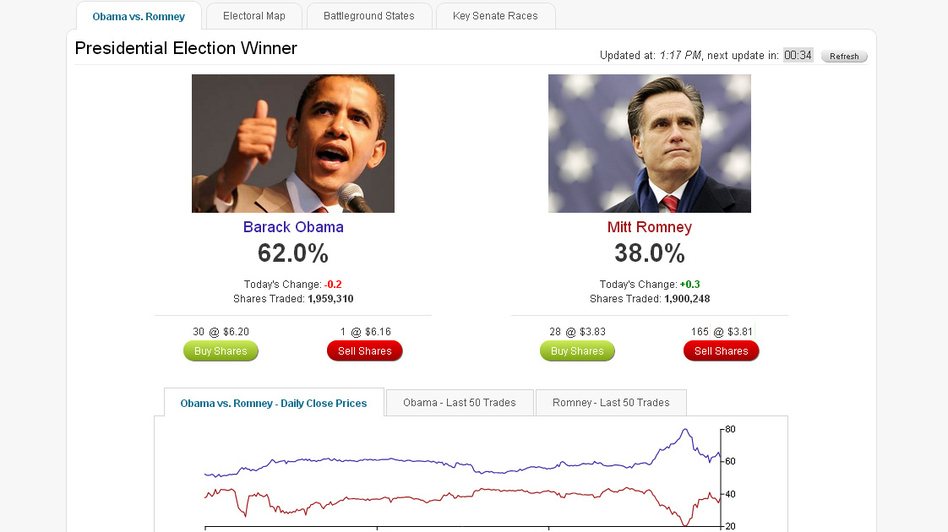Intrade: Crowdsourced Wisdom?

Intrade leveraged the wisdom of crowds by allowing users to bet on future world events and displaying shockingly accurate predictive power in the process.
“Out of all things the CFTC could be doing to protect consumers and investors, it chooses to sue Intrade?!?” – Nate Silver

Financial irregularities aside, Intrade shocked the world with its impressive predictive power, by leveraging the collective wisdom of the crowd, where individuals would put their money where their mouth is.
Intrade was a prediction market where participants could buy shares on whether an event would occur or not. These were binary events with prices between $0 and $1, which fluctuated up and down as Intrade users (the market) would buy or sell on whether they believed this event would happen as described or not. Would Barack Obama win Indiana in the General Election? Would No Country For Old Men win Best Picture? The price between 0 and $1 also represented the percentage likelihood or odds of the event happening. These fluctuations were more liquid than in say, a sportsbook’s championship futures odds, since users could buy or sell these contracts at any time before the binary event ended in a 0 or 1. This means there were full arbitrage opportunities for any user to profit (or lose) if they accurately (or inaccurately) valued the future movement of the “event stock.” The price was meant to be the most accurate barometer of what the market expected about certain events.
The theory was that the wisdom of crowds would be particularly wise when the participants had their greatest skin in the game: their own money. This is touted as a reason why Intrade was consistently more accurate than pre-election polls. (http://voicesweb.org/betting-markets-intrade-more-accurate-polls-market-expert-says) In 2008, Intrade was within one electoral vote of nailing Barack Obama’s margin of victory. A total of $230 million were spent by Intrade users on the 2012 presidential campaign. Soon after its height of international prominence, Intrade eventually dissolved following a financial scandal and a U.S. government lawsuit.
But not before, Intrade leveraged market principles where users made predictions with their money, and the results were astonishingly accurate. Intrade was founded nearly 15 years ago, and it took years to build its stock market-like marketplace. The network effects are harder to pinpoint; does a user want a critical mass where there might be less arbitrage opportunities to make easy money? However, if you want to buy or sell a share in an event, you needed someone on the other side to take the opposing position. Intrade guests (visitors who were interested in the market information but would not buy or sell contracts) were always the beneficiaries of additional users; the assumption is, the more users who bet, the more accurate the price reflected market odds or perception of the likelihood of a specific event occurring.
Intrade created an efficient marketplace for users to find other users to make transactions. Then they captured the value by charging a transaction fee. The Intrade crowd’s accuracy continued to attract participants to play for both profit and entertainment reasons.
Its lawsuit and financial irregularities eventually crumbled Intrade, but the public at large got a taste of the wisdom of the crowds. Other prediction markets have arisen as the public and federal agencies continue to debate on how prediction markets should be regulated and classified. You could bet on politics at sportsbooks for many years, but at a great disadvantage to the house. A full-fledged prediction market early in this digital age proved to be one fascinating and shockingly accurate experiment. What’s to come?


